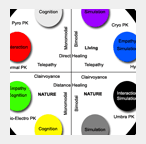Telepathy
Parapsychology Articles, Papers and Books
Home > Articles > Psychical Phenomena > Extrasensory Perception > Telepathy
![]()
|
| NEWSLETTERS |
| Get the best from QPsychics.com in your inbox! |
|
| PARAPSYCHOLOGY ORGANIZATIONS |
"With confidence in the importance of utilizing the investigative mode of the established sciences in order to inquire into the authenticity and to potentially explain the nature of psychical phenomena."  |
 |
 |
 |
 |
Telepathic Interaction
Telepathy is the psychical influence of thought via experient influence over the biological basis of consciousness and the mental process by which we perceive, act, learn and remember; Including mental forms and processes such as the nervous system in which processes and transmits information by electrochemical signaling. Telepathic interaction is “the causal influence of one mind on another without the intervention of the five senses.” Individuals who engage in telepathic interaction (telepathic impressionists) appear to do so in regards to commands, based on the telepathists subconscious need to have the individual (subject) feel a particular way. However, it appears that telepathic interaction is involved in a manner causing a mild hypnotic state in the individual (subject) via a telepathists command to do so, void of the telepathist having to produce mentally any feelings associated with a hypnotic state within him (the telepathist). It is this method of telepathic interaction I call “hypnotic telepathic interaction” or “hypnotic telepathy” that appears to not only evoke strong emotions in the subject, but also typically results in an action on the subjects behalf more often than the method associated with simply “commanding” an act. Therefore, hypnotic telepathic interaction appears to be the strongest form of telepathy and the most dangerous, raising an assortment of moral and ethical questions as to how such an ability should be utilized in practical applications. Further studies on my part have lead to the conclusion that initial telepathic “impressions” (i.e. commands or evoked feelings) do not always fade away with time, but rather occasionally result in the same strength of emotion or “need to act” anytime associated images of the telepathist, or associated feelings pertaining to the feeling evoked by the telepathist, are mentally accessed. Telepathic interaction appears to work more efficiently if the subjects mind is in a relaxed or fatigued state. In regards to the mental state of the telepathist, in intentional telepathic interaction, the telepathist is typically in a relaxed state, while in regards to spontaneous telepathic interaction, the telepathist is typically in a stressed state.
(Adapted from the book “Telepathy: A Quantum Approach” by Theresa M. Kelly, MsD.)
|
|||
Related Articles |
|||

